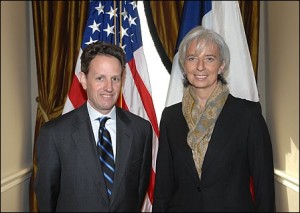
The refusal of European economies to undertake deficit spending to stimulate consumer spending is impeding a global economic recovery.
The latest report from the U.S. Treasury Department that conducts economic analysis confirms that the U.S. economy remains deeply troubled, and that an improvement is not expected anytime soon across broad sectors of the economy. While the report has negative implications for all of us, automakers looking for an upturn in sales will likely have to continue sharp cost cutting actions as sales continue to languish.
In a statement yesterday to the Treasury Borrowing Advisory Committee of the Securities Industry and Financial Markets Association, the Director of the Office of Macroeconomic Analysis, Ralph Monaco, said: “Data for growth in the first quarter will not be available until April 29, but economic indicators released thus far suggest that real GDP declined sharply again in the first three months of 2009. In the fourth quarter of 2008, real GDP fell by 6.3% at an annual rate – the largest quarterly loss since early 1982. That followed a 0.5% decline in the third quarter. Private forecasters are looking for about a 5% decline in the first quarter.”
It was of course the precipitous decline in consumer spending during the second half of 2008 that was largely responsible for the downturn in global economic activity, which sent virtually all of the world’s automakers into losses. A viscous cycle of worker and production cutbacks, which then resulted in declining buyer confidence, which resulted in more losses and cutbacks, was established, a negative trend that persists to this day.
Particularly troublesome for international automakers is the refusal of most governments, except for China and the U.S., to embark on large fiscal spending programs to revive their own economies and bolster consumer confidence and spending.
Treasury noted that consumer spending in the U.S. “stabilized early in the first quarter,” according to data available through February, and appears to be on track to make a modest positive contribution to growth in the first quarter. Preliminary estimates for April U.S. auto sales results show annual selling rates stuck below ten million units, with no signs of recovery. It is not coincidental that over in another part of Treasury, the Auto Task Force is insisting that restructuring plans from Chrysler and General Motors use annual rates of around 10.5 million units in their sales volume assumptions.
The broad-based decline in economic activity over the past several quarters has triggered large job losses and a rise in unemployment, said Treasury. Non-farm payrolls declined by 663,000 in March marking the 15th straight month of such losses.
“More than 5 million (3.9%) jobs have been cut from payrolls since the recession began in December 2007. In percentage terms, the 15-month job loss total is the largest since July 1958. The unemployment rate jumped 0.45 to a 26-year high of 8.5% in March and has risen by 3.6% points since December 2007. Weekly data on initial claims for unemployment insurance point to further job losses in April,” said Monaco.
People without jobs, or worse who feel their jobs are threatened, are unlikely prospects for a new vehicle purchase.
“It will also take time for the stimulus and credit market programs to have a meaningful impact and they will not come without significant costs in the short term. Partly as a result of these programs, the federal budget deficit is expected to rise to $1.75 trillion (12.3% of GDP) in fiscal year 2009 from $459 billion (3.2% of GDP) in fiscal year 2008 according to estimates provided by the Office of Management and Budget.”
“In sum, real GDP is expected to decline further in the near term and job losses and unemployment are likely to mount, concluded Monaco.

How long could the country actually get along if no new cars were built at all?
With the huge number of high quality, long-lasting cars now on the road and the low prices of scores of millions of perfectally good cars could a case be made for not rushing to prop up the auto industry at all?
Just a thought, blasphemous I’m sure, but a thought nevertheless.